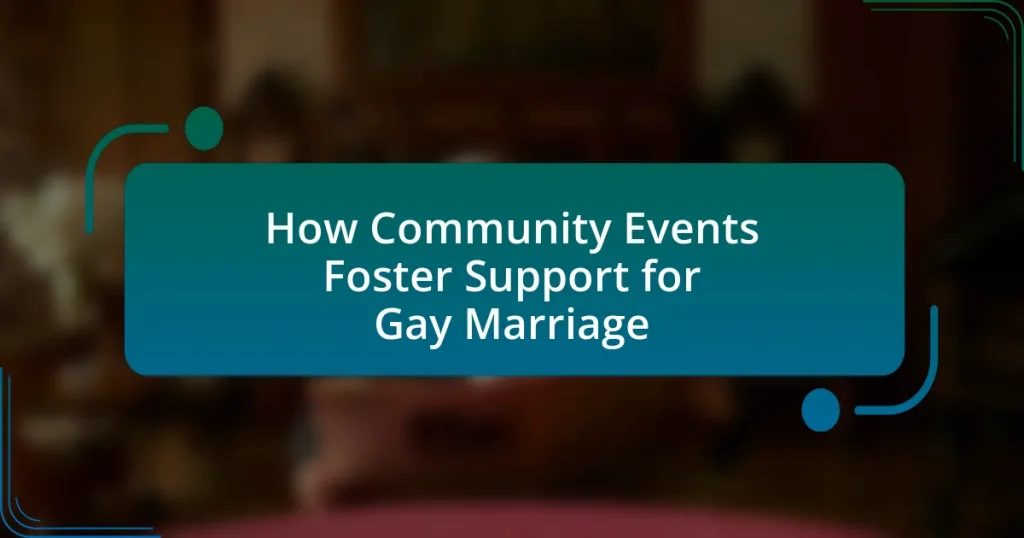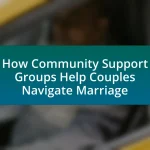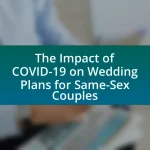Community events play a crucial role in fostering support for gay marriage by enhancing visibility, awareness, and solidarity among diverse groups. Events such as pride parades, educational workshops, and advocacy rallies effectively promote acceptance and understanding of LGBTQ+ issues, leading to increased public support for marriage equality. The article explores the impact of these events on public perception, the importance of educational initiatives, and the challenges faced in organizing such gatherings. Additionally, it discusses strategies for enhancing inclusivity, leveraging technology, and building alliances with local businesses and organizations to strengthen community support for gay marriage.
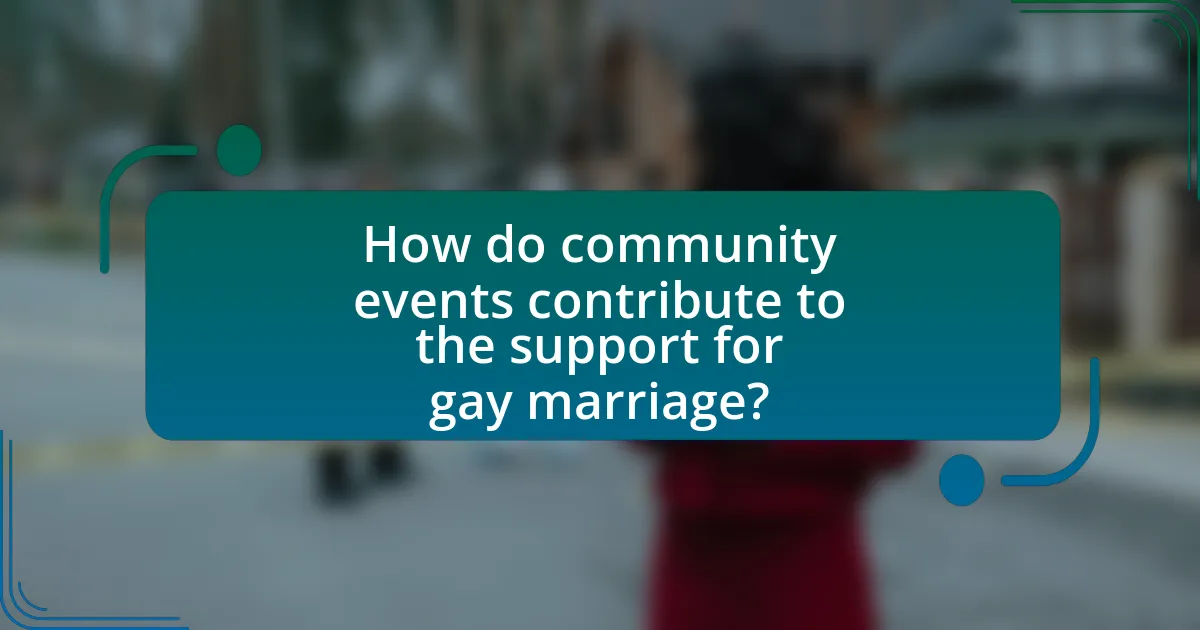
How do community events contribute to the support for gay marriage?
Community events significantly contribute to the support for gay marriage by fostering visibility, awareness, and solidarity among diverse groups. These events, such as pride parades and LGBTQ+ festivals, create a platform for individuals to express their support publicly, thereby normalizing the conversation around gay marriage. Research indicates that participation in such events can increase acceptance and understanding of LGBTQ+ issues; for instance, a study published in the Journal of Homosexuality found that exposure to LGBTQ+ events positively correlates with supportive attitudes toward same-sex marriage. By bringing together allies and advocates, community events help to build a collective identity that reinforces the push for legal recognition and equality in marriage rights.
What types of community events are most effective in promoting gay marriage?
Community events that are most effective in promoting gay marriage include pride parades, educational workshops, and advocacy rallies. Pride parades serve as large-scale celebrations of LGBTQ+ identities, fostering visibility and community support, which can influence public opinion positively towards gay marriage. Educational workshops provide information on legal rights and the importance of marriage equality, helping to dispel myths and misconceptions. Advocacy rallies mobilize community members and allies, demonstrating collective support for gay marriage, which can sway undecided individuals and policymakers. Research indicates that communities with active LGBTQ+ events see higher levels of acceptance and support for marriage equality, as evidenced by studies showing increased public support in areas with regular pride events.
How do pride parades influence public perception of gay marriage?
Pride parades significantly influence public perception of gay marriage by promoting visibility and acceptance of LGBTQ+ identities. These events create a platform for individuals to express their sexual orientation openly, fostering a sense of community and solidarity. Research indicates that increased visibility of LGBTQ+ individuals in public spaces correlates with greater societal acceptance of gay marriage; for example, a study published in the American Journal of Sociology found that areas with pride parades experienced a measurable increase in support for same-sex marriage over time. This visibility challenges stereotypes and normalizes LGBTQ+ relationships, contributing to a shift in public attitudes toward marriage equality.
What role do educational workshops play in fostering support for gay marriage?
Educational workshops play a crucial role in fostering support for gay marriage by providing information, promoting understanding, and encouraging dialogue among participants. These workshops educate attendees about LGBTQ+ rights, the legal aspects of marriage equality, and the social benefits of inclusivity, which can shift perceptions and reduce prejudice. Research indicates that informed individuals are more likely to support gay marriage; for instance, a study by the Williams Institute found that increased awareness of LGBTQ+ issues correlates with higher levels of support for marriage equality. By creating a safe space for discussion, educational workshops also facilitate personal connections and empathy, further enhancing community support for gay marriage.
Why are community events important for LGBTQ+ visibility?
Community events are crucial for LGBTQ+ visibility because they create safe spaces for individuals to express their identities and foster a sense of belonging. These events, such as Pride parades and festivals, not only celebrate LGBTQ+ culture but also raise awareness about the challenges faced by the community. For instance, a study by the Williams Institute found that public displays of LGBTQ+ pride can significantly influence societal attitudes, leading to increased acceptance and support for LGBTQ+ rights, including gay marriage. By participating in community events, LGBTQ+ individuals can connect with allies, advocate for their rights, and promote visibility, which is essential for achieving equality and acceptance in society.
How do community events help in building alliances with allies?
Community events facilitate the formation of alliances with allies by creating shared experiences and fostering open dialogue among diverse groups. These gatherings provide a platform for individuals and organizations to connect, share their stories, and collaborate on common goals, such as advocating for gay marriage. For instance, events like pride parades and community forums have historically united various stakeholders, including LGBTQ+ individuals, allies, and advocacy groups, thereby strengthening their collective voice. Research indicates that participation in community events increases social cohesion and trust, which are essential for building lasting alliances.
What impact do community events have on local legislation regarding gay marriage?
Community events significantly influence local legislation regarding gay marriage by fostering public awareness and support. These events, such as pride parades and educational forums, create platforms for dialogue and visibility, which can shift public opinion in favor of LGBTQ+ rights. For instance, a study by the Williams Institute found that increased visibility of LGBTQ+ individuals and issues at community events correlates with higher levels of support for same-sex marriage legislation. This public support can pressure local lawmakers to advocate for or enact pro-gay marriage policies, as seen in various jurisdictions where community mobilization has led to legislative changes.
How do community events create a sense of belonging for LGBTQ+ individuals?
Community events create a sense of belonging for LGBTQ+ individuals by providing safe spaces for social interaction and affirmation of identity. These events, such as pride parades and LGBTQ+ festivals, foster community cohesion and visibility, allowing individuals to connect with others who share similar experiences and challenges. Research indicates that participation in such events can significantly enhance feelings of acceptance and support, as evidenced by a study published in the Journal of Homosexuality, which found that LGBTQ+ individuals who engage in community activities report higher levels of well-being and social support. This sense of belonging is crucial for mental health and resilience, reinforcing the importance of community events in the LGBTQ+ experience.
What emotional benefits do participants gain from attending these events?
Participants gain emotional benefits such as increased feelings of belonging, acceptance, and empowerment from attending community events that support gay marriage. These events create a safe space for individuals to express their identities and connect with like-minded people, fostering a sense of community. Research indicates that social support and shared experiences significantly enhance emotional well-being, as evidenced by a study published in the Journal of Homosexuality, which found that LGBTQ+ individuals who engage in community events report higher levels of life satisfaction and lower levels of anxiety and depression.
How do community events facilitate networking among LGBTQ+ individuals?
Community events facilitate networking among LGBTQ+ individuals by providing safe spaces for social interaction and relationship building. These events, such as pride parades, workshops, and social gatherings, encourage participation and foster connections through shared experiences and common interests. Research indicates that LGBTQ+ individuals often face social isolation; community events counteract this by creating opportunities for individuals to meet others, share resources, and build supportive networks. For instance, a study published in the Journal of Homosexuality highlights that participation in community events significantly increases feelings of belonging and support among LGBTQ+ individuals, thereby enhancing their social networks.
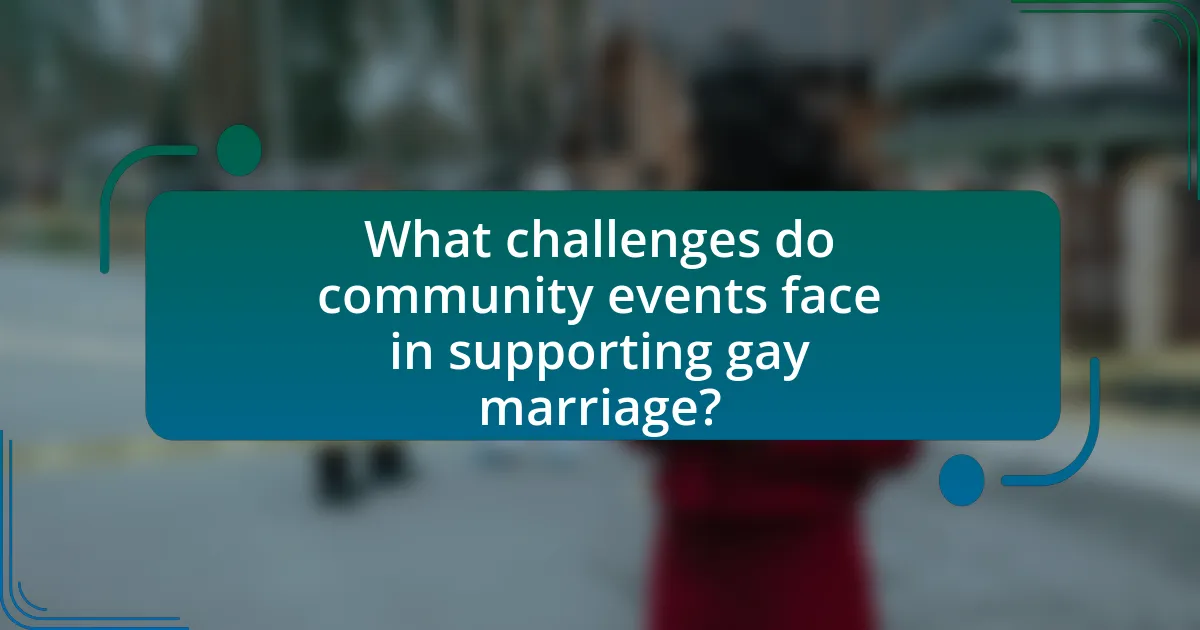
What challenges do community events face in supporting gay marriage?
Community events face several challenges in supporting gay marriage, primarily stemming from societal stigma, legal barriers, and resource limitations. Societal stigma can lead to backlash from conservative groups, which may discourage participation and support for these events. Legal barriers, such as varying state laws regarding marriage equality, can create confusion and limit the scope of events. Additionally, resource limitations, including funding and volunteer support, can hinder the organization and promotion of community events aimed at advocating for gay marriage. These challenges collectively impact the effectiveness and reach of community efforts to foster support for gay marriage.
How do funding and resources affect the organization of community events?
Funding and resources significantly influence the organization of community events by determining the scale, quality, and reach of these events. Adequate funding allows for better venue selection, professional staffing, and comprehensive marketing efforts, which can enhance attendance and engagement. For instance, a study by the National Endowment for the Arts found that events with higher budgets tend to attract larger audiences and generate more community involvement. Additionally, resources such as volunteers and partnerships with local businesses can amplify the impact of community events, fostering a supportive environment for initiatives like gay marriage advocacy.
What strategies can be employed to overcome financial barriers?
To overcome financial barriers, individuals and organizations can employ strategies such as fundraising events, grant applications, and community partnerships. Fundraising events, like charity runs or auctions, can generate significant financial support while raising awareness for the cause. Grant applications to foundations that support LGBTQ+ initiatives can provide essential funding; for instance, the Arcus Foundation has funded various projects aimed at advancing LGBTQ+ rights. Additionally, forming partnerships with local businesses can lead to sponsorship opportunities, reducing costs and increasing resources available for community events that promote support for gay marriage. These strategies have been effective in mobilizing financial resources to support LGBTQ+ initiatives.
How do social and political climates impact community event planning?
Social and political climates significantly influence community event planning by shaping the themes, messaging, and participation levels of events. For instance, during periods of heightened social acceptance of LGBTQ+ rights, community events such as pride parades and rallies can attract larger crowds and foster greater engagement, as seen in cities where local governments actively support such initiatives. Conversely, in politically conservative environments, event planners may face challenges such as pushback from local authorities or community members, which can lead to altered event formats or increased security measures. Historical data shows that after the legalization of same-sex marriage in various regions, community events celebrating this milestone saw a surge in attendance, reflecting a direct correlation between political progress and community engagement.
What are the potential risks associated with organizing community events?
The potential risks associated with organizing community events include financial liability, safety concerns, and community backlash. Financial liability arises when event organizers face unexpected costs or low attendance, which can lead to significant losses. Safety concerns are critical, as events may attract large crowds, increasing the risk of accidents or emergencies, such as injuries or health issues. Community backlash can occur if the event is perceived as controversial or divisive, potentially alienating certain groups and leading to protests or negative publicity. These risks highlight the importance of thorough planning and risk management in the organization of community events.
How can organizers ensure the safety of participants at these events?
Organizers can ensure the safety of participants at community events supporting gay marriage by implementing comprehensive security measures. These measures include hiring trained security personnel, conducting risk assessments prior to the event, and establishing clear emergency protocols. For instance, a study by the Human Rights Campaign indicates that events with visible security presence and well-communicated safety plans experience fewer incidents of harassment or violence. Additionally, organizers can collaborate with local law enforcement to ensure a rapid response to any potential threats, further enhancing participant safety.
What measures can be taken to address backlash from opposing groups?
To address backlash from opposing groups, community organizers can implement inclusive dialogue initiatives that foster understanding and reduce tensions. These initiatives can include town hall meetings, workshops, and forums where both supporters and opponents of gay marriage can express their views in a respectful environment. Research indicates that open communication can lead to increased empathy and reduced hostility, as seen in studies conducted by the Public Religion Research Institute, which found that personal interactions often shift perceptions positively. Additionally, providing educational resources about the benefits of gay marriage and its impact on the community can help counter misinformation and build support.
How can community events adapt to changing societal attitudes towards gay marriage?
Community events can adapt to changing societal attitudes towards gay marriage by incorporating inclusive programming that reflects diverse perspectives and promotes dialogue. For instance, events can feature speakers from the LGBTQ+ community, provide educational workshops on LGBTQ+ rights, and celebrate milestones in the fight for marriage equality. Research indicates that community engagement fosters understanding and acceptance; a study by the Williams Institute found that increased visibility of LGBTQ+ individuals in community settings correlates with greater public support for gay marriage. By actively involving the community in these discussions and celebrations, events can effectively respond to and shape evolving societal attitudes.
What innovative approaches can be used to engage a broader audience?
Innovative approaches to engage a broader audience include utilizing social media campaigns, interactive workshops, and community partnerships. Social media campaigns can amplify messages by reaching diverse demographics, as evidenced by the 2015 #LoveWins campaign, which significantly increased visibility for LGBTQ+ rights. Interactive workshops foster personal connections and understanding, allowing participants to share experiences and learn from one another, thereby creating a more inclusive environment. Additionally, forming partnerships with local businesses and organizations can enhance outreach efforts, as collaboration often leads to increased resources and shared audiences, exemplified by events like Pride festivals that attract varied community members.
How can technology enhance the reach and impact of community events?
Technology can enhance the reach and impact of community events by utilizing digital platforms for promotion, engagement, and participation. For instance, social media channels enable organizers to share event details widely, attracting a larger audience and fostering community involvement. According to a study by the Pew Research Center, 69% of adults in the U.S. use social media, which demonstrates its effectiveness in reaching diverse demographics. Additionally, live streaming technology allows individuals who cannot attend in person to participate virtually, thereby increasing overall engagement. Research from Eventbrite indicates that events with a digital presence can see up to 30% higher attendance rates. These technological tools not only broaden the audience but also enhance the overall experience, making community events more impactful.
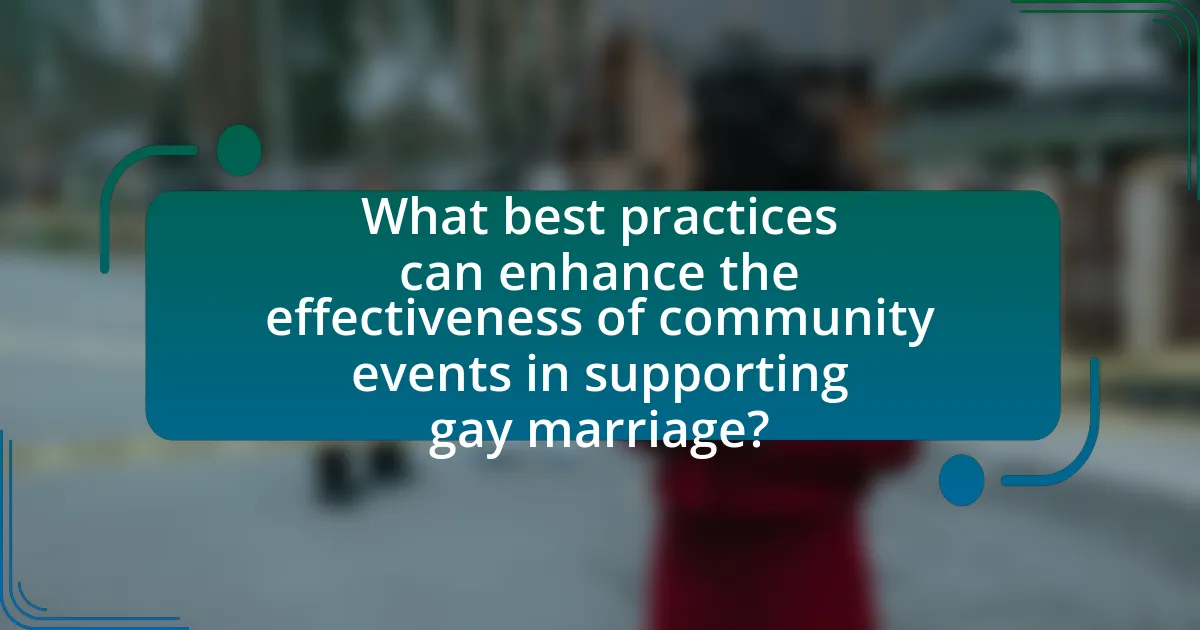
What best practices can enhance the effectiveness of community events in supporting gay marriage?
To enhance the effectiveness of community events in supporting gay marriage, organizers should prioritize inclusivity, visibility, and education. Inclusivity ensures that all community members feel welcome and represented, which can be achieved by actively involving diverse voices in planning and execution. Visibility can be enhanced through strategic marketing and partnerships with local LGBTQ+ organizations, increasing attendance and engagement. Education plays a crucial role; providing informative sessions about the legal, social, and emotional aspects of gay marriage can foster understanding and support. Research indicates that events that incorporate these elements tend to attract larger audiences and generate more positive community dialogue, ultimately strengthening support for gay marriage initiatives.
How can collaboration with local businesses strengthen community events?
Collaboration with local businesses can strengthen community events by providing essential resources, financial support, and increased visibility. Local businesses often contribute sponsorships, which can enhance the scale and quality of events, making them more appealing to attendees. For instance, a study by the National Federation of Independent Business found that local businesses that engage in community events can increase their customer base by up to 30%, demonstrating the mutual benefits of such partnerships. Additionally, local businesses can promote events through their networks, attracting a larger audience and fostering a sense of community ownership and pride, which is particularly important in initiatives supporting social causes like gay marriage.
What benefits do partnerships with local organizations provide?
Partnerships with local organizations provide enhanced community engagement and resource sharing, which are crucial for fostering support for gay marriage. These collaborations allow for pooling of resources, such as funding and volunteers, which can amplify the reach and impact of community events. For instance, a study by the Williams Institute found that local organizations significantly increase participation in advocacy events, leading to greater visibility and support for LGBTQ+ rights, including gay marriage. Additionally, partnerships can facilitate access to diverse networks, enabling broader outreach and education efforts that resonate with various community segments.
How can sponsorships be leveraged to enhance event visibility?
Sponsorships can be leveraged to enhance event visibility by providing financial support and promotional resources that increase outreach and engagement. When organizations sponsor an event, they often promote it through their own marketing channels, which can include social media, email newsletters, and websites, thereby reaching a broader audience. For example, a study by the Event Marketing Institute found that 84% of consumers who attend sponsored events have a more positive opinion of the sponsoring brand, which indicates that sponsorship can significantly boost visibility and perception. Additionally, sponsors may offer promotional materials, branded merchandise, or even co-hosting opportunities, all of which contribute to heightened awareness and attendance at the event.
What role does social media play in promoting community events for gay marriage?
Social media plays a crucial role in promoting community events for gay marriage by providing a platform for widespread outreach and engagement. It enables organizers to share event details, mobilize supporters, and foster community connections through targeted advertising and organic sharing. For instance, studies show that events promoted on platforms like Facebook and Instagram can reach thousands of users quickly, significantly increasing attendance and participation. Additionally, social media facilitates real-time interaction, allowing attendees to share their experiences and encourage others to join, thereby amplifying the event’s visibility and impact within the community.
How can effective social media strategies increase event attendance?
Effective social media strategies can significantly increase event attendance by enhancing visibility and engagement among target audiences. By utilizing platforms like Facebook, Instagram, and Twitter, event organizers can create targeted advertisements and engaging content that resonate with specific demographics, leading to higher interest and participation. For instance, a study by Eventbrite found that 80% of event organizers reported that social media was their most effective marketing tool, directly correlating to increased ticket sales and attendance. Additionally, leveraging user-generated content and encouraging attendees to share their experiences can create a sense of community and excitement, further driving attendance.
What types of content resonate most with audiences on social media platforms?
Visual content, particularly videos and images, resonates most with audiences on social media platforms. Research indicates that posts featuring visuals receive 94% more views than those without. Additionally, emotionally engaging content, such as personal stories and testimonials, also garners significant interaction, as it fosters connection and relatability among users. For instance, a study by BuzzSumo found that emotional content is shared 2.5 times more than neutral content, highlighting the importance of evoking feelings in social media engagement.
What are some tips for creating inclusive and welcoming community events?
To create inclusive and welcoming community events, organizers should prioritize diverse representation and accessibility. Ensuring that event planning includes voices from various backgrounds—such as different sexual orientations, ethnicities, and abilities—fosters a sense of belonging. Additionally, providing accessible venues and materials, such as sign language interpreters and wheelchair access, accommodates all participants. Research indicates that inclusive events can increase community engagement and support for initiatives like gay marriage, as they create environments where individuals feel valued and heard. For instance, a study by the Human Rights Campaign found that inclusive community events significantly enhance awareness and acceptance of LGBTQ+ issues, leading to greater support for policies like marriage equality.
How can event organizers ensure diverse representation in programming?
Event organizers can ensure diverse representation in programming by actively seeking input from underrepresented communities and incorporating their perspectives into event planning. This can be achieved through outreach initiatives that engage diverse groups, such as LGBTQ+ organizations, cultural associations, and advocacy groups, ensuring their voices are included in the programming process. Research indicates that events with diverse representation not only enhance community engagement but also foster a more inclusive atmosphere, which is crucial for supporting causes like gay marriage. For instance, a study by the Human Rights Campaign found that inclusive programming significantly increases participation and support from marginalized communities, highlighting the importance of representation in fostering solidarity and advocacy.
What feedback mechanisms can be implemented to improve future events?
Surveys and post-event evaluations can be implemented as effective feedback mechanisms to improve future community events supporting gay marriage. These tools allow organizers to gather direct input from participants regarding their experiences, preferences, and suggestions for improvement. For instance, a study by the Event Marketing Institute found that 70% of attendees are willing to provide feedback if asked, highlighting the importance of engaging the audience in the evaluation process. Additionally, focus groups can be utilized to facilitate in-depth discussions, enabling organizers to capture nuanced perspectives and foster a sense of community involvement. Implementing these feedback mechanisms ensures that future events are more aligned with the interests and needs of the community, ultimately enhancing their effectiveness in promoting support for gay marriage.
